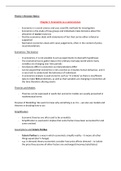📖
Week 4 - Technology
Class Media Theory
Categorie Class Readings
Date
Materials
Status Done
Type Exam prep
Context
Technology, in relation to identity and culture
→ where do we, human beings, stand in relation to technology?
Britisch Cultural Studies / CCCS / Birmingham School
Structure / agency debate: How much are we ‘molded’ into subjects by the
media and ideology? How much agency / free will do we have?
Relation to Marx; people make their own history, but not under the material
conditions of their own choosing → he says we live in the structure / cage of the
dominant ideology, and people don’t realise that. And we need to overthrow it.
CCCS critiques Marx; the dominant ideology is not just focred on people; its a
process.
People need to agree/ be conviced.
And it’s also dynamic; its not static, it changes.
Antonio Gramsci
Hegemony: the process by which the dominant ideoloty is accepted as “self-
evident” and “natural” - but needs “negotiation” to create “consent”
Force / Coercion VS concent / hegemony
Week 4 - Technology 1
, Louis Althusser
Repressive State Apparatus (RSA): “force” via law, police, justice system
Ideological state Apparatus (ISA): “consent” via education, family, religion →
similar to Foucoults social knowledge system.
Interpelation:
Individuals are addressed and recognized by social institutions, such as the
media or the education system.
when we are addressed by these institutions, we are not recognized as
concrete individuals, but rather as preconceived, generalized subjects.
This process of recognition is called interpellation.
Individuals are often misrecognized by social institutions because they are
not fully conscious of the social structures that shape their identities.
As a result, individuals may internalize misrecognition and come to see
themselves as the subjects that social institutions have defined them to be.
Interpelation and Media:
Individuals are addressed as consumers or viewers with certain desires and
interests. These desires and interests are not innate, but rather are
constructed by the media and other social institutions.
We are constantly adressed by the media as an individual with free will,
giving you the impression that we have agency, freedom to choose what
we want to do
But, says Althusser, you are not adressed as an individual, the person that
you are - you are adressed as a preconceived, generalised person; they put
their ideas of who you are on you while adressing you.
As a result, individuals may come to see themselves as consumers or
viewers with certain tastes and preferences, which are determined by the
social structures of the media and other institutions.
It is hereby kind of telling you who you should be.
He’s a structuralist
there is an ideology and you are molded by the media into a specific subject
position through interprelation
Stuart Hall - one of the founders of CCCS
Week 4 - Technology 2
Week 4 - Technology
Class Media Theory
Categorie Class Readings
Date
Materials
Status Done
Type Exam prep
Context
Technology, in relation to identity and culture
→ where do we, human beings, stand in relation to technology?
Britisch Cultural Studies / CCCS / Birmingham School
Structure / agency debate: How much are we ‘molded’ into subjects by the
media and ideology? How much agency / free will do we have?
Relation to Marx; people make their own history, but not under the material
conditions of their own choosing → he says we live in the structure / cage of the
dominant ideology, and people don’t realise that. And we need to overthrow it.
CCCS critiques Marx; the dominant ideology is not just focred on people; its a
process.
People need to agree/ be conviced.
And it’s also dynamic; its not static, it changes.
Antonio Gramsci
Hegemony: the process by which the dominant ideoloty is accepted as “self-
evident” and “natural” - but needs “negotiation” to create “consent”
Force / Coercion VS concent / hegemony
Week 4 - Technology 1
, Louis Althusser
Repressive State Apparatus (RSA): “force” via law, police, justice system
Ideological state Apparatus (ISA): “consent” via education, family, religion →
similar to Foucoults social knowledge system.
Interpelation:
Individuals are addressed and recognized by social institutions, such as the
media or the education system.
when we are addressed by these institutions, we are not recognized as
concrete individuals, but rather as preconceived, generalized subjects.
This process of recognition is called interpellation.
Individuals are often misrecognized by social institutions because they are
not fully conscious of the social structures that shape their identities.
As a result, individuals may internalize misrecognition and come to see
themselves as the subjects that social institutions have defined them to be.
Interpelation and Media:
Individuals are addressed as consumers or viewers with certain desires and
interests. These desires and interests are not innate, but rather are
constructed by the media and other social institutions.
We are constantly adressed by the media as an individual with free will,
giving you the impression that we have agency, freedom to choose what
we want to do
But, says Althusser, you are not adressed as an individual, the person that
you are - you are adressed as a preconceived, generalised person; they put
their ideas of who you are on you while adressing you.
As a result, individuals may come to see themselves as consumers or
viewers with certain tastes and preferences, which are determined by the
social structures of the media and other institutions.
It is hereby kind of telling you who you should be.
He’s a structuralist
there is an ideology and you are molded by the media into a specific subject
position through interprelation
Stuart Hall - one of the founders of CCCS
Week 4 - Technology 2










